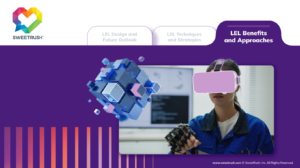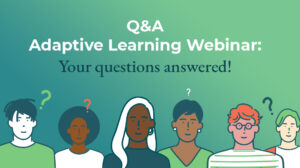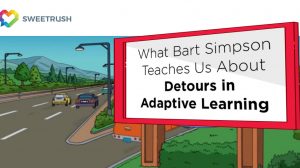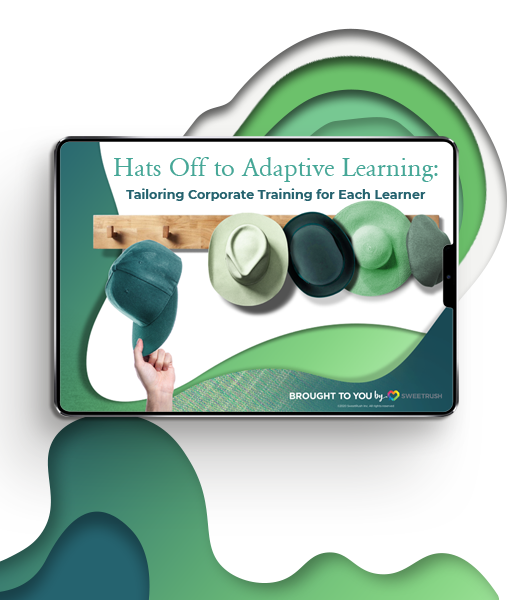Adaptive Learning

What is “adaptive learning” and why is it important?
Adaptive learning—or personalized learning—is a smarter alternative to traditional, “one-size-fits-all” training. Think about it: Our uniqueness is what makes each of us special. We each perceive the world around us differently, and we each possess different talents and abilities. So why, then, do those in Learning and Development tend to treat all learners as homogenous, delivering identical learning programs with identical content and learning experiences?
Enter the adaptive learning model, which is a learner-centric approach to training—tailoring the learning experience to one’s unique situation as a learner at that moment.
The result? Learning that is more relevant, practical, and engaging—even more delightful. (And it doesn’t require an expensive tech investment.) We create and build adaptive learning solutions that effectively meet their objectives and deliver a better experience for learners.
Adaptive Learning Awards
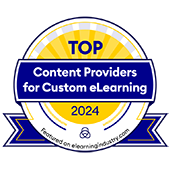
TOP PROVIDER
Custom eLearning Content
eLearning Industry
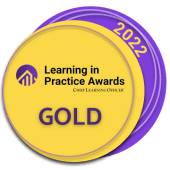
GOLD
Excellence in eLearning
Chief Learning Officer
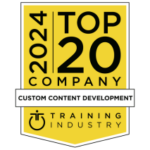
TOP 20
Content Development Company
Training Industry
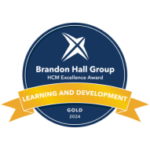
GOLD
Best Advance in Custom Content
Brandon Hall Excellence Awards
Adaptive Learning Strategy
Formulating your adaptive learning strategy requires some critical considerations, each key to making adaptive learning work.
Business Drivers
When it comes to meeting learner (and business) goals and realizing ROI, adaptive learning makes sense. Taking the traditional instructor-centric (rather than a student-centric) learning approach of providing a single learning experience for everyone hardly serves learners—nor is it efficient. Its typical outcome is this: Some learners will be overwhelmed while others will be bored, leading in both cases to poor engagement and very little actual learning. Which makes it that much harder to achieve your organization’s goals.
With an adaptive learning approach, you give learners the content they need when they need it. It’s as simple as giving learners a choice to explore a topic more deeply or varying a course’s pathway to better suit their needs—and as complex as implementing AI into your courses to dynamically serve training. However you choose to do it, adaptive learning is a smarter way to move your people and your company ahead.


Audience
In this era of ever-evolving smartphones and faster everything, we’re used to accessing information and content—whatever it may be—in an instant. Learners today are short on time and patience, and yet their needs are greater than ever. Meeting them where they’re at, providing just-in-time training they can take with ease and that’s relevant to their needs, is what works for today’s audiences. With a variety of modalities and technologies at our disposal, together we can craft a learner-centric solution.
Engagement
How do you train learners on their terms? It can be bare bones, such as providing a minimalist path through the subject and offering compelling links along the way to learn more. Or, create nano learning—short, single-topic vignettes that engage and nudge them to dig deeper, or that allow learners to pick and choose the subjects relevant to them.
Most authoring tools support the addition of push detours, such as dynamic assessments. These use a test-teach-retest approach, first assessing what knowledge and skills a learner possesses, then teaching the learner content they demonstrated a need for, and finally retesting to ensure mastery. Use AI that recognizes behavioral patterns and provides experiences and content relevant to them and what they prefer.


Learning
We all have professional goals, and a desire to know and understand. A great learning program should anticipate that and provide instruction that’s relevant to us. We learn best by doing and practicing. Whatever the modality, effective training should center around each learner’s needs, tailored to how they best think.
Technology
There are a variety of adaptive learning technologies we can use to deploy your training. Some LMSes and authoring tools include adaptive learning capabilities, which we know how to use—and often work quite well with a combination of our creative strategies and backend development.
AI is one of many tools we can use to enable you to deliver adaptive learning to your audience: based on how a learner performs on a pre-assessment, it can create a customized learning plan, then dynamically generate required lessons. You can also provide pull detours—the option to explore certain things at greater length. Learning content can be generated based on role and responsibility, ensuring that necessary training is undertaken.
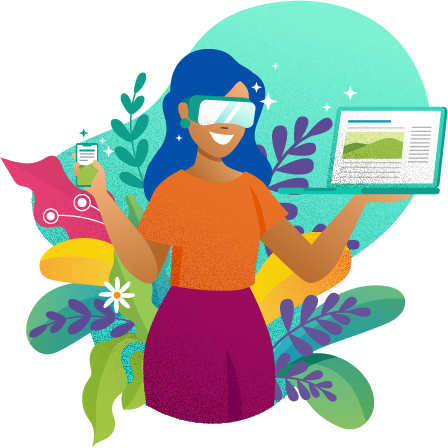
Blogs, News, and Events
Modernizing Instructor-Led Training with Live Experiential Learning: Benefits and Approaches
In today’s rapidly evolving business landscape, traditional learning modalities often fall short in preparing individuals..
Adaptive Learning: Your Questions Answered!
At our webinar, One Size Fits No One: Tailoring Learning Experiences to Individual Interests, Knowledge,..
What Bart Simpson Teaches Us About Detours in Adaptive Learning
According to an in-depth article by SweetRush, providing detours in adaptive learning reduces boredom and..
